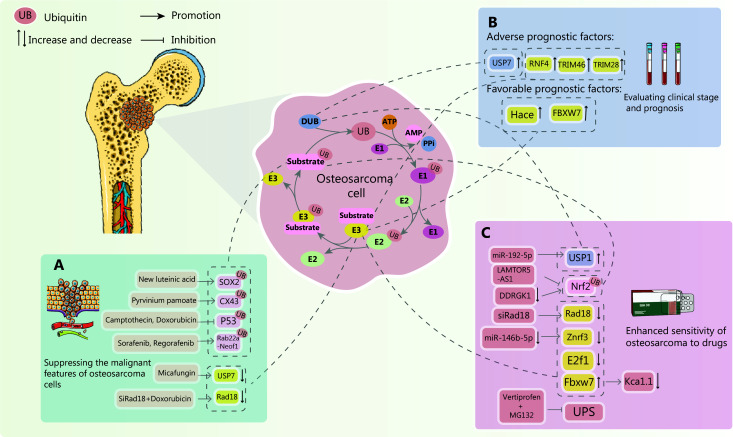Figure 4.
The potential of ubiquitination modulation in osteosarcoma treatment. In the context of osteosarcoma, targeting ubiquitination pathways has emerged as a promising therapeutic strategy. Recent research has yielded significant advancements in prognostic assessment, overcoming drug resistance, and inhibiting tumor development through ubiquitination-based interventions. (A) New Luteinic acid interacts with USP9X to directly target the ubiquitination and degradation of the key transcription factor, sex determining region Y box protein 2 (SOX2), significantly inhibiting osteosarcoma cell proliferation. Pyrvinium pamoate, a casein kinase 1 (CK1α) activator, promotes the ubiquitination and degradation of connexin 43 (CX43), hindering osteosarcoma metastasis. Sorafenib and remifentanil ubiquitinate and degrade RAB22A-NEOF1, blocking RAB22A-NEOF1-driven lung metastasis. Camptothecin or adriamycin treatment reduces p53 ubiquitination, stabilizing p53 protein levels, and inhibiting osteosarcoma cell proliferation. Micafungin exerts its anti-tumor effect on osteosarcoma by downregulating USP7. Adriamycin, encapsulated in nanoparticles and combined with siRNA targeting RAD18, significantly inhibits tumor growth and metastasis by reducing RAD18 expression. (B) Research has demonstrated that in osteosarcoma patients, elevated levels of ubiquitin ligases RNF4, TRIM46, TRIM28, and the deubiquitinase USP47 are associated with poor prognosis, whereas elevated levels of ubiquitin ligases HACE and FBXW7 indicate a favorable prognosis. (C) Mir-192-5p enhances the susceptibility of osteosarcoma cells to cisplatin by downregulating USP1 expression. Lamtor5-as1 increases chemosensitivity by inhibiting Nrf2 ubiquitination, leading to decreased Nrf2 transcriptional activity and disruption of the pro-survival loop in drug-resistant cells. Targeting DDRGK1 can reduce its expression and further promote Nrf2 ubiquitination, enhancing tumor drug sensitivity. RGD exosome-delivered SIRAD18 effectively silences the ubiquitin ligase RAD18, potentially enhancing anti-tumor drug activity. Inhibiting E2F1-mediated retinoic acid receptor α ubiquitination can improve drug efficacy in osteosarcoma treatment. Vertiprofen (VP), in combination with the proteasome inhibitor, MG132, simultaneously inhibits the ubiquitin-proteasome system (UPS) and enhances chemotherapy sensitivity by regulating autophagy and protein homeostasis. Inhibiting miR-146b-5p and downregulating the cell surface E3 ligase, ZNRF3, ultimately sensitizes osteosarcoma cells to chemotherapeutic drugs. The E3 ligase, FBXW7, downregulates the calcium-activated potassium channel, KCa1.1, overcoming osteosarcoma drug resistance.

